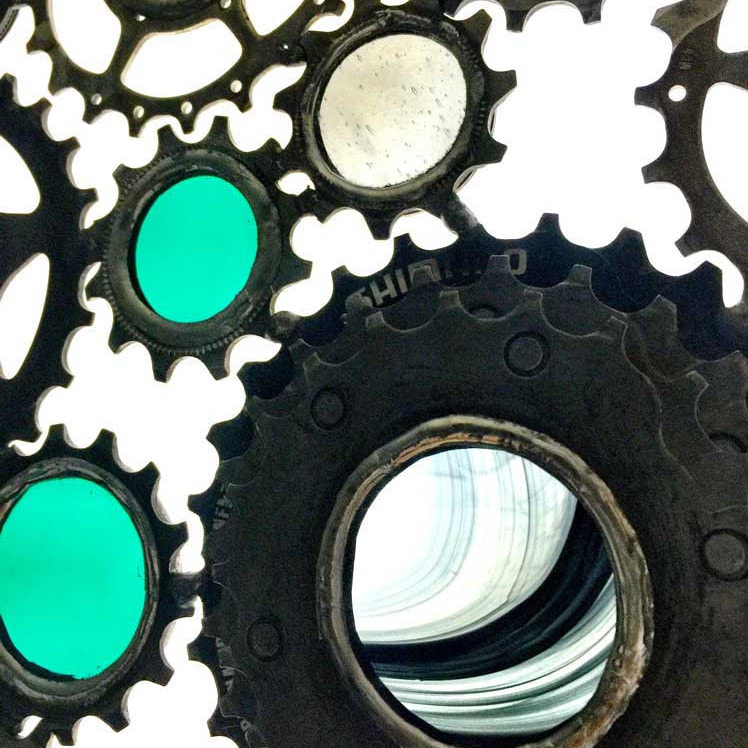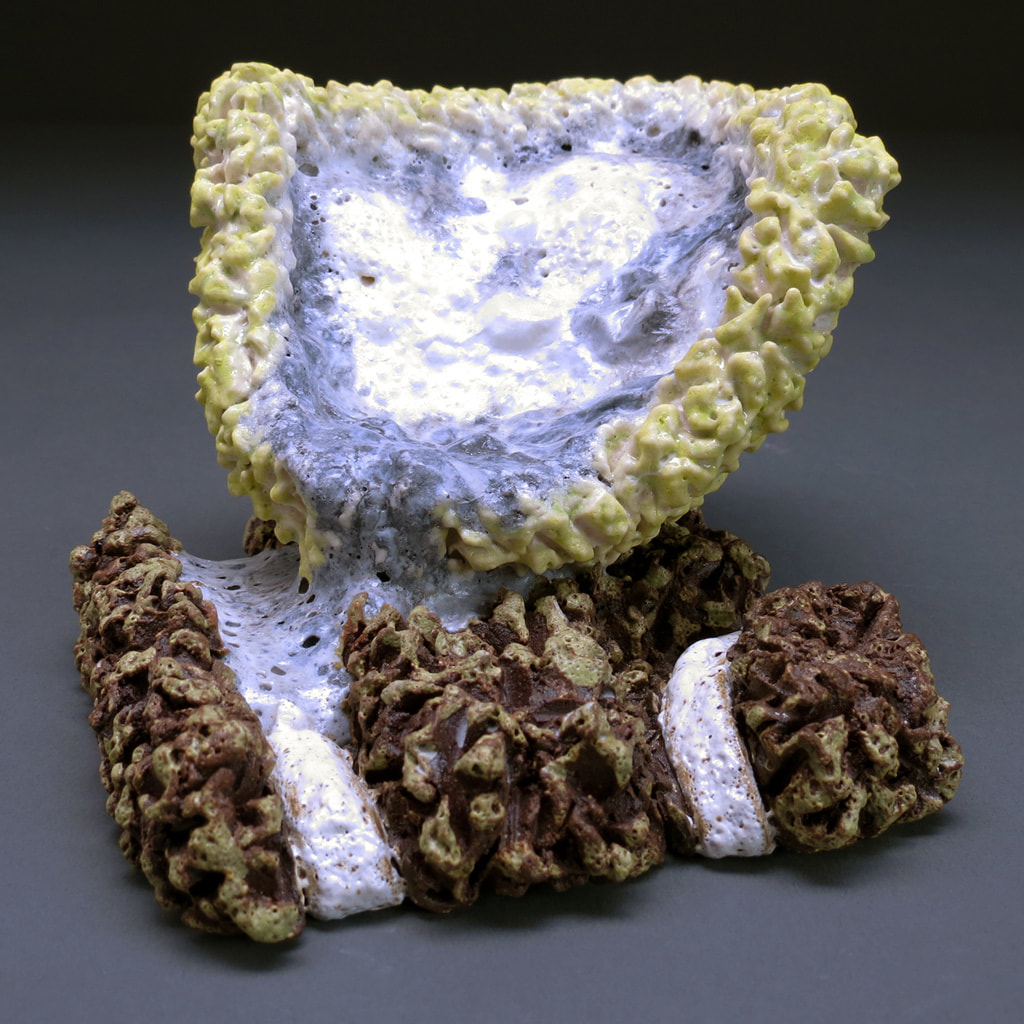|
Art Inspired by Movement Picture a group of snowboarders carving up a mountain, leaving a variety of lines in the snow. Even after they are gone, the traces they left are testament to the dynamic movement, energy, and the fun they had. Now, picture a bicycle in a street race. Individual spokes are disappearing because the wheels are turning so quickly. The gears are spinning similarly fast and all you are able to see is a blurred image of what you know is a gear wheel. Getting inspired by fast movements, capturing what these do to their surroundings, freezing a fleeting moment in time -- that is what both of these artists do so beautifully in their art. Brian Echerer’s sculptures are made out of gears and spokes, the very elements that are so dynamic when in use, but now forced by him into permanent positions. The surface of some of Ian Wieczorek’s ceramic pieces shows deep fissures, crossing and intersecting with each other. They might as well have been carved by mini snowboarders coming down the sides in a wild race of bliss. It is a manifestation of both artists’ deep love for different sports that is influencing their artistic creativity. Sport Begets Art Brian Echerer was an avid bicycle racer who participated in road races, mountain biking and cyclocross.”My art is cycle-centric and an expression of my passion for cycling. But to me these pieces are no longer chains and gears. It’s like a different medium now.” Bicycle art has been around for a while. People have created bracelets out of spokes for example. Brian at one point realized that “you can do so much more with it.” He added decorations to his spoke bracelets and started selling them at the Saturday market, on Etsy, and other places. “I am lucky in that if I can imagine something in my head, I know I can make it come to life.” Not surprisingly, Brian prefers the term “maker” over “artist.” Self-taught, he has been constantly expanding his skill set as his visions became more elaborate. “When I needed to learn how to weld in order to create my vision, I watched YouTube videos and learned from others how to do it.” He did the same when there was a need for soldering, for glass pieces to be incorporated into his art. “Often it’s trial and error,” he adds. “Even as a child, I was always taking things apart and putting them back together, learning on the fly.” Ian Wieczorek explains that “my sculptures are drawn from my experience with action sports. It’s all about fully living in the moment, being hyper-focused on what I am doing.” He transfers that “meditative state” into the studio, where everything is in a state of flow and he just creates and responds. Creating ceramics is a hands-on, almost “sensual” experience. “I particularly like that clay displays different characteristics in the different states of creating ceramics. Initially, it’s wet and malleable. When dry or after a firing, I get to use a different approach and tools to continue making the piece into what I envisioned.” Working with glazes and the chemistry behind it “engages the nerdy folds of my brain,” he explains. In contrast to the intuitive process of creating the sculpture, when glazing, he needs to be very precise with measurements and temperatures,“ otherwise the piece is a brown pot and not a vibrant sculpture. And it’s fun to create unique glazes that complement the different textures and forms. It keeps things fresh.” Life’s Double Takes
Both Ian and Brian very much appreciate being a part of the art collective where an artist can hang his or her art for much longer than in traditional galleries. They also cite the opportunity to exchange ideas and learn from other artists as yet another element that the gallery brings to its members. It’s funny that Ian and Brian are having a show together because of how their artistic lives intertwine before. Ian joined the gallery in October of last year. He lives nearby and walking on Alberta Street, he noticed a few people painting the walls in a store and putting finishing touches on what is now our new gallery space. He walked in, started a conversation, and ended up jurying into the art collective. Brian, on the other hand, is one of the main reasons that the gallery looked at this space when we lost our lease in the old location. He and Maquette (one of last month’s featured artists), in different ways, were instrumental in negotiating the terms, getting people excited about this opportunity and making it finally happen. About Art and the Process of Making it “I would describe my style as simple, classy, chunky,” says Brian. Indeed, all elements are visible and uncluttered. Not pretentious at all. When asked the same question, Ian describes his style with words like “flowing,” “expressive,” “texture,” “movement” and “gestures”. No surprise that he draws inspiration from interviews and clips of snowboarders talking about their passion for the sport. Brian early on was influenced by his parents and an uncle who all are artists in a variety of artistic endeavors. Ian says that “I want my art to provoke a spark of energy, curiosity and imagination. And the impulse to touch the textures.” He looks up to progressive ceramic artists like Ken Price, Peter Voulkos and Ron Nagel. He admires how these artists have been changing how people look at pottery; from something that is “pretty” and “decorative” to a contemporary place that is edgy and expressive. When making art, Brian is fascinated by the fact that he “can visualize a piece in my head and make that. It’s almost mystical. To envision something and bring it into the real world as an object.” When asked what he wants people to walk away with after seeing his art, he says “the art” and laughs. Seriously, he loves seeing people’s reactions to his pieces. In fact, it was a strong reaction of a person at his stand at the Saturday Market that made him realize that he is an artist in his own right. It took persistence on his part and that is also his advice to young artists. “If there is a will, there is a way. Persistence will win the day more times than not.” For Ian, the most fun about creating art is “getting in there and making.” To be in a studio, listening to good music, enjoying the company of other artists and getting lost in discovery. His advice is “Chase your curiosities; who knows where you will go. Because mine have taken me around the world.” Comments are closed.
|
Archives
September 2023
Categories |




 RSS Feed
RSS Feed